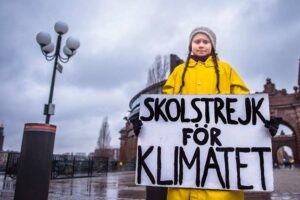Much of the health debate over climate change has been very clear – it’s not a good thing for human beings. There’s increasing air pollution and its associated risks, the marked increase in skin cancers or the poisoning of our food chain – in fact science is now very clear that the physical risks to the human body are huge. But what about our mental health? What about the mental health of the young especially?
It’s been amazing to see the younger generations galvanise themselves – in many many ways this really is their fight. But what of the consequences?
I can remember being young and filled with worry and fear in the early 80’s – the risk of nuclear war  seemed immense & my generation marched, joined CND and hoped for a better world. I was too young at the time to consider if that impacted my, or my friends, mental health. I know now however that it simply had to. And that was in an age before we had instantaneous 24hr communication, before we had social media hooking us into reinforcement loops and, frankly, before the world became such a polarised place. So what is the impact on today’s young people?
seemed immense & my generation marched, joined CND and hoped for a better world. I was too young at the time to consider if that impacted my, or my friends, mental health. I know now however that it simply had to. And that was in an age before we had instantaneous 24hr communication, before we had social media hooking us into reinforcement loops and, frankly, before the world became such a polarised place. So what is the impact on today’s young people?
The brains of children and teens are still growing and developing, notes Lise Van Susteren. She’s a psychologist in Washington, D.C. and an expert on the mental-health effects of climate change. Those growing brains make young people “particularly vulnerable to environmental stressors,” she wrote last year in an expert report for a court case in America where young people sued the US government for it’s failure to act on climate change.
The bodies response to stress is to release complex hormones and chemicals to try and counter it – the oft referred to fight or flight responses. And these are especially powerful for young peoples who’s bodies, brains and emotions are still developing. Much as in physical first aid we’ll often reference that children don’t yet have the physical reserves to fight conditions like hypothermia or hypoglycemia – they also don’t always have the emotional experience or reserves to deal with prolonged levels of stress and anxiety. There are also other developmental factors to consider – poor performance at school, impact on home life & changed social dynamics can all have lasting consequences.
![]()
![]()
 Children who are active in the climate change protests have been questioned in both America and Australia and reported grief, anger, resentment and confusion. But they’ve also specifically referenced Depression, Stress & Anxiety – conditions that those attending any of our Mental Health First Aid courses know can all be precursor conditions to worsening mental health.
Children who are active in the climate change protests have been questioned in both America and Australia and reported grief, anger, resentment and confusion. But they’ve also specifically referenced Depression, Stress & Anxiety – conditions that those attending any of our Mental Health First Aid courses know can all be precursor conditions to worsening mental health.
So what can we do:
- It’s highly likely that the protest movements springing up around the world are actually helping – they offer hope, empowerment and a feeling of inclusion.
- But – those are all attributes that we can and should be fostering in our young people – as parents, as carers, as educators and as society.
- Take the time to listen to a young person when they express their concerns.
- Do some simple things to let them know their concerns matter; switch of the lights, walk (with them) to the shops, try and make a little difference.










